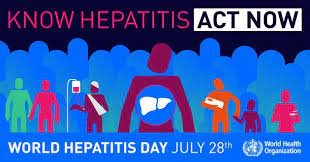World Hepatitis Day 2023 – Promoting Awareness and Prevention
World Hepatitis Day is observed on July 28th each year to raise awareness about viral hepatitis, its impact on global health, and the measures needed to combat this preventable disease. This day provides an opportunity to mobilize efforts to tackle hepatitis and encourage actions for prevention, diagnosis, and treatment. In 2023, as we mark World Hepatitis Day, it is crucial to highlight the significance of this occasion, the historical context of hepatitis, and its importance in various government exams for positions such as teachers, police officers, banking, railways, defense, and civil services.

Why World Hepatitis Day 2023 is Important:
Raising Awareness and Reducing Stigma
World Hepatitis Day serves as a platform to raise awareness about hepatitis, educating people about its transmission, prevention, and treatment. For government exam aspirants, understanding the social and medical aspects of hepatitis is crucial as it aligns with public health policies and initiatives.
Impact on Global Health
Viral hepatitis affects millions of people worldwide, leading to significant morbidity and mortality. Students preparing for various government positions need to comprehend the disease burden and the strategies to address this public health challenge.
Relevance in Government Exams
Questions related to communicable diseases, preventive healthcare, and global health initiatives often appear in government exams. World Hepatitis Day provides a specific context for students to grasp the importance of addressing hepatitis in a broader socio-economic context.
Historical Context:
World Hepatitis Day was established by the World Health Organization (WHO) in collaboration with the World Hepatitis Alliance in 2008. The day was designated to raise awareness about hepatitis and promote its prevention, diagnosis, and treatment. The date, July 28th, was chosen in honor of Nobel Laureate Professor Baruch S. Blumberg, who discovered the hepatitis B virus and developed its vaccine.
Hepatitis has been a longstanding public health concern, with references to the disease dating back centuries. However, it wasn’t until the 20th century that scientists began identifying different types of hepatitis viruses and understanding their modes of transmission. With advancements in medical research and technology, effective vaccines and treatments have been developed, offering hope for the prevention and management of hepatitis.
Key Takeaways from World Hepatitis Day 2023
| Serial No. | Key Takeaway |
|---|---|
| 1. | Hepatitis is a preventable viral disease that affects the liver and poses a significant public health challenge globally. |
| 2. | Government exams may include questions about different hepatitis types, their modes of transmission, and the importance of vaccinations and screening. |
| 3. | Aspirants should be familiar with the global initiatives to eliminate hepatitis and the role of government agencies and healthcare organizations in achieving this goal. |
| 4. | Understanding the social stigma associated with hepatitis is essential for developing effective awareness campaigns and promoting testing and treatment. |
| 5. | Students preparing for medical positions should be aware of the long-term consequences of hepatitis infections, such as liver cirrhosis and hepatocellular carcinoma. |
Important FAQs for Students from this News
Q: What is the significance of World Hepatitis Day?
A: World Hepatitis Day holds immense importance as it raises awareness about viral hepatitis, its impact on global health, and the measures needed to combat the disease. It emphasizes the need for prevention, diagnosis, and treatment to reduce its burden on public health.
Q: How does viral hepatitis spread, and what are the different types of hepatitis viruses?
A: Hepatitis can spread through various means, including contaminated food and water, unsafe injection practices, and unprotected sexual contact. There are five main types of hepatitis viruses: A, B, C, D, and E, each with distinct transmission routes and health implications.
Q: Why is it essential for students preparing for government exams to understand hepatitis-related topics?
A: Knowledge of hepatitis is crucial for government exam aspirants, especially in positions related to healthcare, public health policies, and preventive measures. Questions related to communicable diseases, preventive healthcare, and global health initiatives often appear in these exams.
Q: How can hepatitis be prevented, and what are the long-term consequences of hepatitis infections?
A: Hepatitis can be prevented through vaccination, safe injection practices, and maintaining proper hygiene. Long-term consequences of hepatitis B and C infections include liver cirrhosis and an increased risk of liver cancer, making early detection and management vital.
Q: What is the historical context of World Hepatitis Day, and who established it?
A: World Hepatitis Day was established by the World Health Organization (WHO) in collaboration with the World Hepatitis Alliance in 2008. It was designated on July 28th to honor Professor Baruch S. Blumberg, who discovered the hepatitis B virus and developed its vaccine.
Some Important Current Affairs Links

















